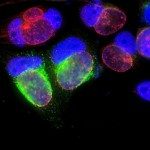Lien vers Pubmed [PMID] – 24581691
Curr. Opin. Microbiol. 2014 Feb;17:38-45
Bacteria that interact with eukaryotic cells have developed a variety of strategies to divert host lipids, or cellular processes driven by lipids, to their benefit. Host lipids serve as building blocks for bacterial membrane formation and as energy source. They promote the formation of specific microdomains, facilitating interactions with the host. Host lipids are also critical players in the entry of bacteria or toxins into cells, and, for bacteria growing inside parasitophorous vacuoles, in building a secure shelter. Bacterial dissemination is often dependent on enzymatic activities targeting host lipids. Finally, on a larger scale, long lasting parasitic association can disturb host lipid metabolism so deeply as to ‘reprogram’ it, as proposed in the case of Mycobacterium infection.


